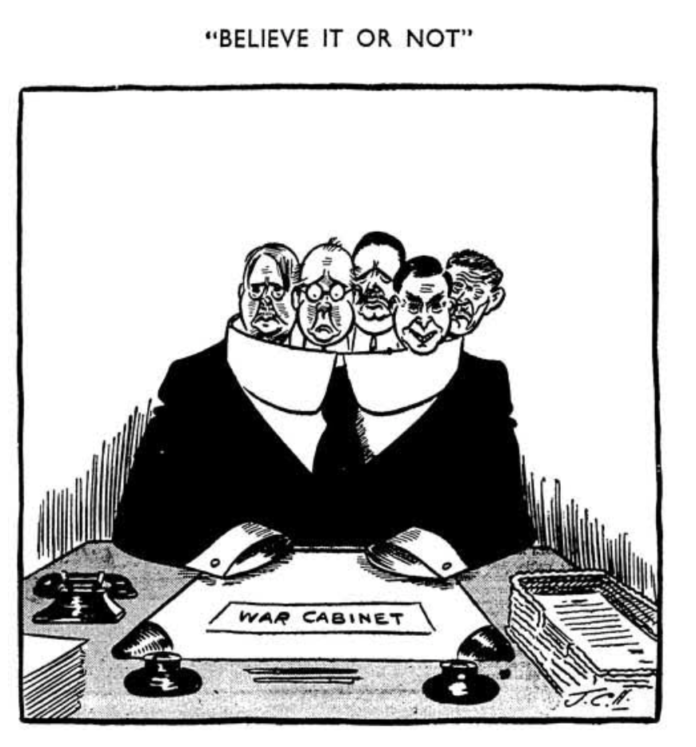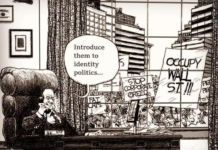I must confess myself in possession of a certain mounting disquiet at the escalating drum-beat echoing through our political commentariat of late.
It started shortly after it became apparent that the present crisis was, in fact, a Crisis with a Capital C. Journalists bringing up from the vault of history the fact that in times of dire national emergency, another form of Capital C would often step to the fore and take the reins. Coalition.
Not like the one we’ve presently got empanelled and empowered, which however rough around certain sesquipedalian edges (I mean Shane Jones, not me – I’ve been out ahead of the curve socially isolating from politics and politicians for some time!) – nevertheless represents a pretty broad confederation of New Zealand opinion. And whose actions, at least thus far, appear to have met the Crisis with a clear majority of significant, concerned public support.
No, the rising murmuring from the cheap seats in and about the Parliamentary Press Gallery is for a Coalition of an altogether different, *Grander* kind.
Featuring the National Party.
Now, to be fair and sure – there are good reasons amidst extraordinary circumstances to ensure that Her Majesty’s Loyal Opposition remain ‘inside the tent’ on decision-making. Like it or not, National does represent – at least nominally – four in every ten voting New Zealanders (as does, per Preferred Prime Ministership polling, Jacinda Ardern herself … generally four times or more the average support Simon Bridges can muster). And with that in mind, it is good and worthwhile that the Government we have has taken active steps to consult with, and keep ‘in the loop’, their erstwile opponents across from the Treasury Benches.
Indeed, following on from the falsetto-fallout from Simon Bridges’ roundly rebuked response to the Government’s initial handing of the Crisis – which looked to just about everybody like grand-standing looking for a marquee to shiver into; coming, as it did, hot on the heels of National MP David Bennett appearing to encourage ‘panic buying’, and National Health spokesperson Michael Woodhouse doubling down upon the results for political attack points …
… it was heartening to see all parties in Parliament come together at the outset of the State of Emergency Proper, and seemingly speak with one voice for a change.
Yet having the Opposition ‘inside the tent’ is a double-edged cutty thing. Bring your critics too far inside the tent’s corridors of power with you, and they are no longer your critics – they are your effective co-conspirators. Scrutiny and constitutionally mandated oversight can be lost amidst Cabinet postings and Collective Responsibility.
Or you can find situations similar to that between Shane Jones and the Green Party – wherein one leg of the Government appears to be engaged in a long-term kicking-rather-than-footsie under the table with another limb, for latter-term presumptive polled-political payoff in the future. That is to say – portions of the bridge-crew of the Ship of State may go from Struggling, Together to Struggling Together; with consequent deleterious consequences for the collective war-effort all up.
It is also a somewhat open question as to whether our Government would be more expeditious or more effective amidst Emergency if it suddenly had to both account for and incorporate perhaps twice as many perspectives and political egos in its trenchant policy and philosophy-potentiating mix. After all, it was only a few days ago that Simon Bridges was jumping up and down castigating the Government for putting money toward unemployment support alongside business … rather than more or even all business all the time. How much longer might it have taken to rustle up and then roll out a revised response-plan which he’d be prepared to sign his name to alongside the Leaders and Ministers of the other Parties of power. And at what cost (in multiple senses of the term) would that have been.
So bearing in mind that there is already a mechanism in place to ensure that National gets its voices heard, and ensure its constitutionally mandated ability to apply scrutiny to the Government’s response – via a specially convened cross-party Parliamentary body chaired by Bridges and with powers ordinarily the preserve of the Privileges Committee …
… The question before the house, is what would be gained by actually bringing National into Government. What would the difference be, and why should we embark upon such a course?
The answers provided by the media talking heads pushing the proposition, thus far, haven’t exactly been compelling. The main one appears to be “because we’ve always done this” – with the two major points of precedency cited being the Wartime Coalition of the First World War, and the Wartime Cabinet of the Second.
This isn’t necessarily a great argument for the present circumstances; partially because they’re two different approaches (a Cabinet versus a full-blown Coalition) – and largely because the Fraser-led War Cabinet ran rather swiftly into the trouble of a newly minted National Party Leader looking to make a name for himself by flouncing out of it over an optics-ideological flare-up. It probably says something about the situation that other National MPs in said Cabinet did not agree with Holland’s (the National party Leader in question) decision and effectively chose to became rebels from their own party leader to continue serving the nation and national interest (rather than, perhaps, National’s interest) in response.
The other argument put forward – in today’s Herald piece by Hamish Rutherford, as it happens – is that this or that extant Government Minister is questionably competent elsewhere, and that therefore the National Party should be called upon to provide part of the Government. And while I am no fan of Shane Jones on general principle (one of the two Ministers identified by Rutherford, along with Phil Twyford), I have not thus far seen anything in the extant Government response to suggest either significant role for these two Ministers, nor significant failing of the Response all up, to demand a wholesale confederation with National as even a stop-gap solution.
The better point insinuated by Rutherford, is that in the event the Covid-19 Crisis forestalls the General Election scheduled for later this year – a power-sharing agreement may be preferable to a lengthening of the present administration’s term in office until such time as we can safely hold a Vote.
I say “better”, but that does not mean I agree with it, either – especially as it seems altogether premature in late March, a week into Lockdown, to be talking about cancelling Democracy in early September as if it has already come to pass. And besides, if we are playing the “but we’ve done it before” game – the Parliamentary Term in which Fraser’s War Cabinet occurred ran almost five years between Elections, and had been legally empowered to last if necessary until a year after the War’s eventual end.
Now, lest somebody misinterpret me with the above remonstration of facts – I am not suggesting the indefinite suspension of democracy in favour of Winston upon a Golden Throne Uber Alles and Ad Nauseum/Infinatum (although some might argue that MMP, for the foreseeable future effectively seems to work like that anyway). Just demonstrating a further manner in which the “but it’s tradition!” approach is one to be careful with when operating out of hand.
Should we get to a situation wherein the Election must be forestalled by more than a few months in the name of public safety, then a tough, robust, and imaginative conversation must presumably be had about what it is we’re going to do going forward from there. Members of our Greatest Generation already sacrificed their lives for Democracy once before – there is no just cause to force them to stand again within the crucible upon the altar, this time of disease and circumstance rather than battlefield conditions, simply to avoid putting off a vote for a few weeks or months.
Yet equally, every New Zealander does deserve the chance to have their voice heard upon the makeup and direction of our Government – whether roaring full-throated approval for one side or the other (or the other or the other or the other – this being an ‘MMP environment’, after all), or merely resigned to the fact that no matter when or how the electoral system is convened and congealed, it seems inexorably to produce ‘politicians’ as its ultimate outcome, leaving us to try and make the best of it in Polling Day’s wake.
But these are thoughts for the medium term or long term future. Prudent, perhaps, to quietly consider the relative merits of – just not something one expects to be made use of to try and propel a scatter-shot case for Simon Bridges as Junior Deputy Prime Minister Number Two, effective by Tuesday.
What I think’s driving this all up, is twofold. First, as Michael Cullen once put it – the ‘beach cricket’ mentality at the heart of much of modern political choice and perception out there in the general Electorate. Grant Robertson said this was an expression of our hard-embedded commitment to a certain concept of “fairness” as a people. The idea that it’s ‘not fair’ for one guy or one side to be in at bat the whole time, so power ought be alternated (or, in this hypothetical case, apparently ‘shared’) between the teams. And surprising as it may seem, that idea does have some place within a democracy – otherwise you end up with a significantly large chunk of your society drifting off into its own marginalized and echo-chamber-conspiracy prone bubble before eventually bubbling over back into the mainstream astride boxes of soap, ballot, and even bullet style nature.
But the other, rather more insiduous motif is that somebody out there has realized that, for various reasons … regardless of whether or not there is an Election later this year, National is highly unlikely to win it. Therefore rendering their only chance at the prevaricating prospect of power being the co-option of it via co-operation with the Government that we’ve already got in at the moment.
National therefore gaining through ‘Wartime Coalition’ provisions what it could not provide for itself in earnest via electoral means – Ministerial positions, prestige and the edifying scent of victory, being part of the solution instead of simply simpering from the sidelines of the popular consciousness on bare-double-digits in preferred prime ministership polls.
And if that is the motive, then that is quite another sort of story indeed.
Now, I should take a moment to acknowledge my bias here. I voted for one of the parties presently in Government; and have not been entirely un-pleased with the Government’s track-record in office thus far. More importantly for the present circumstances, I have also been significantly more enthused by its recent measures of the past few weeks in moving to handle the current Crisis emergency. Others will understandably differ in their assessment on either score.
I don’t doubt that various people talking up the alleged necessity of a Wartime Coalition or Cabinet are doing so with good intentions; and with at least a partial view to the preservation of our democracy even amidst its prospective temporary suspension should needs must later in this year.
But I have as yet seen no sustained, critical analysis of the concept being put forward in riposte nor reply to those soundbites and now full-length articles occurring in our nation’s news-media proffering this ‘conglomeration’ concept. And in these times, an idea with some memetic saliency can take off and run half way around the bubble-that-is-our-world afore critical, second thought has got its boots on.
These are, after all, unprecedented times – and I therefore think we should be very careful about just blithely slapping forward “we should just do what we did more than a century ago during the First World War all over again!” as an insta-relevant proposition.
And besides, I’d much rather a coalition with the people of New Zealand than the National Party, anyway.






They should be all lumped together. I have no doubt that to a “man” they’ve all given their allegiance to “finding the light”.
No! Keep the Brylcreme Kid and Co. well out of it. Otherwise it would be like swallowing a piranha.
Pablo
“….it seems inexorably to produce ‘politicians’ as its ultimate outcome….”
People constantly complain about this. But when an election throws up a non-politician – Trump in the US, Zelenskiy in the Ukraine – people complain just as much. And non-pollies – elevated by an election to high office – usually turn out to be completely useless at the political process which is required to get things done. Just because they aren’t pollies. Note Trump’s inability to get his foreign policy platform past the Washington Establishment. And look at the godawful mess in the Ukraine at present.
Although, in fairness to Trump, he’s just the latest in a very, very long line of US presidents in my lifetime – all of them pollies, as I recall – who have been completely unable to make a dent in the direction of US foreign policy. Even those who wanted to.
“….the alleged necessity of a Wartime Coalition or Cabinet….”
I am no fan of the current government, but I utterly oppose such a proposal. Our democracy would thereby be endangered, and for what?
As of this morning, according to RNZ, at least 21,000 tests have been carried out. And the 1pm news bulletin says we have how many cases? 708. How many in hospital? 14. How many in ICU? 2. How many deaths? 1. While any deaths are too many, the seasonal flu causes many more each year. And we’re wrecking our economy – and proposing to crimp our democracy – just for these numbers? People – and especially pollies – need to get a grip…
See this:
https://off-guardian.org/2020/03/30/covid19-yet-to-impact-europes-overall-mortality/
The image reminds me of the piece from Beetlejuce where the trickster is waiting his turn to die, thinks the queue is too long, filches a better ticket and gets a certain look. And that is the level of political interplay that we’d get with a grouping of Labour Coalition and National with David Seymour as the trickster.
(https://www.youtube.com/watch?v=Fj_inlzsDhQ
Warlike political associations are like shadow-boxing.
In ancient Greek, “crisis” stands for a precarious situation, uncertainty or distress, and at the same time for a turning point, an escalation or a decision. The coronavirus pandemic can be viewed as a crisis and, in particular, as an “infra-structural” crisis.
“Infrastructure” insofar as the current restrictions on mobility and everyday life have been introduced with the expressed aim of protecting one infrastructure from collapse and making another infrastructure work as well as possible.
Firstly, there is the health infrastructure, hospitals should not burst at the seams. Secondly there is the research infrastructure at universities and research centers that are expected to work together to develop suitable treatments.
The actual risk to human life from the virus per se is low in number; what should be avoided is a collapse of the health system, meaning “infrastructure” in the sense of essential common services for society.
In other words, the vulnerability that many people are suddenly reminded of is less of a medical nature than a result of our institutions’ inability to manage unexpected healthcare needs.
Of course, there is also fear that the preventive measures taken from Europe to the Pacific will affect other infrastructures, first of all infrastructure for food supply.
Food security?
How is it assured that it will not be happen in AO/NZ?
How would a food supply scenario work out for the Asia-Pacific?
How could it affect urban versus rural communities.
Where are scientists and logistical planners undertaking such modeling?
Time for serious and tangible science. Time for infrastructure in support of society.
What could a Grand Coalition possibly contribute to this?
System Change. Now.
https://www.youtube.com/watch?v=DhZrozNmTDk
COP- 22: Health: the New Paradigm for Local Climate Action
manfred staab: “….there is the health infrastructure….”
The very best thing that could come out of this imbroglio is a serious beefing-up of our health services, most especially our hospitals. Those services have been grossly underfunded since I worked in the health sector many years ago. That flapping sound? All the health sector-related chickens coming home to roost. And yes: it is neoliberalism which is to blame for the current parlous state of affairs.
Mike the Lefty: “So who is wanting a “grand coalition” then?”
Hamish Rutherford is mentioned in this post. The author also notes “…the rising murmuring from the cheap seats in and about the Parliamentary Press Gallery…”. He may be privy to this sort of thing, but we the public wouldn’t necessarily get to hear about it. I’ve seen the odd mention of it: in news items, I think, or maybe in journalist comments about what’s happening right now. I’ve not taken it seriously; until I saw this post, that is.
The very idea scares the shit out of me. It’s absolutely the last thing we need, right now or ever.
Comments are closed.